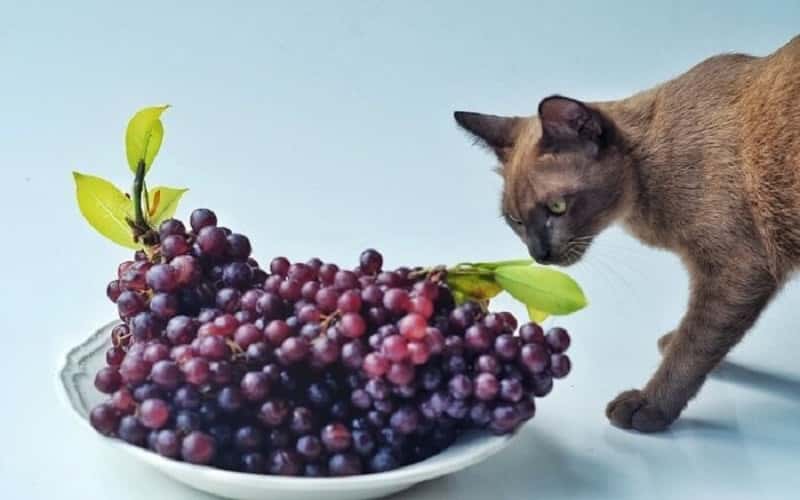Can Cats Eat Grapes? 12 All Facts You Must Know
Nutritional Value of Grapes
Grapes are high in a variety of nutrients, including fiber, vitamins C and K, potassium, and antioxidants. One cup of grapes has 104 calories, 1g of protein, 0.2g of fat, and 27g of carbohydrates (including natural sugar). Grapes also contain resveratrol, a compound linked to a variety of health benefits such as inflammation reduction, blood pressure reduction, and heart health improvement.
Overall, including grapes in your diet can be a tasty and nutritious way to increase your intake of essential nutrients.
Are Grapes Harmful to Cats?
Yes, grapes are poisonous to cats. Even in small amounts, grapes and raisins can cause kidney failure in cats. Toxic symptoms may include vomiting, diarrhea, lethargy, and a loss of appetite. If you suspect your cat has eaten grapes or raisins, seek veterinary attention right away.
How Toxic Are Grapes For Cats?
Although the exact amount of grapes required to cause toxicity in cats is unknown, it is best to avoid feeding grapes or raisins to cats entirely. If you suspect your cat has eaten grapes or raisins, seek veterinary care right away. Vomiting, diarrhea, lethargy, loss of appetite, and increased thirst and urination are all symptoms of grape or raisin toxicity in cats.
Grape Toxicity Symptoms in Cats
Grape toxicity in cats is characterized by vomiting, diarrhea, lethargy, loss of appetite, abdominal pain, and dehydration. Cats may develop acute kidney failure, which can be fatal in severe cases. If you suspect your cat has consumed grapes or grape-containing products, seek immediate veterinary attention.
What Should You Do If Your Cat Eats Grapes?
If your cat eats grapes, take them to a veterinarian right away because grapes and raisins are toxic to cats and can cause kidney failure. If possible, try to determine how many grapes your cat consumed and when they were consumed, as this information will assist your veterinarian in determining the best course of treatment. Meanwhile, do not induce vomiting or administer over-the-counter medications to your cat without first consulting a veterinarian.
Grape Poisoning Treatment for Cats
Grape poisoning in cats is typically treated by inducing vomiting and administering activated charcoal to prevent further toxin absorption. Intravenous fluids may also be administered to assist with kidney flushing.
Hospitalization and more intensive treatments, such as dialysis or blood transfusions, may be required in severe cases. If you suspect your cat has eaten grapes or raisins, seek veterinary care right away because prompt treatment can improve your cat's chances of full recovery.
Stopping Cats From Eating Grapes
Grapes should not be fed to cats because they are toxic and can cause kidney failure. To keep cats from eating grapes, keep all grape-containing foods out of reach, especially in areas where cats can get to them. If your cat accidentally consumes grapes or exhibits toxicity symptoms such as vomiting, lethargy, or decreased appetite, seek veterinary attention right away.
Consultation with a Veterinarian Regarding Your Cat's Diet
It is critical to consult a veterinarian about your cat's diet to ensure their health and well-being. A veterinarian can advise you on the best types and amounts of food to feed your cat, as well as feeding schedules and portion sizes.
They can also assist you in addressing any dietary concerns or issues your cat may be experiencing, such as obesity or allergies. Working with a veterinarian to develop a balanced and nutritious diet for your cat can help prevent health issues and extend their life.
Other Human Foods That Cats Should Avoid
Chocolate, caffeine, alcohol, onions, garlic, grapes and raisins, avocado, raw or undercooked meat, fish bones, and fatty foods are all dangerous to cats. In severe cases, these foods can cause gastrointestinal upset, pancreatitis, kidney failure, seizures, and even death. Keep these foods out of your cat's reach and always consult with a veterinarian if you suspect your cat has eaten something harmful.
Cat Fruit Alternatives
While cats are carnivorous and require a high-protein diet, there are some fruits that they can consume in moderation. Small portions of bananas, strawberries, blueberries, and watermelon are some alternative fruits for cats. It is important to note that fruits should only be given to cats as a treat and should not constitute a large portion of their diet.
Furthermore, some fruits, such as grapes and raisins, should be avoided because they are toxic to cats.
Finally, can cats eat grapes?
Cats should not consume grapes. Grapes and raisins are poisonous to cats and can lead to kidney failure. Keep grapes and raisins out of your cat's reach and seek veterinary care immediately if you suspect they have eaten them.
FAQ stands for Frequently Asked Questions.
Can Kittens Consume Grapes?
Grapes and raisins are poisonous to cats and can result in kidney failure. It is critical to keep these foods out of reach of your feline companions.
Summary:
Cats should never be fed grapes or raisins because they are toxic to them.
source https://blogcatmoments.blogspot.com/2023/08/can-cats-eat-grapes-12-all-facts-you.html




0 Comments: